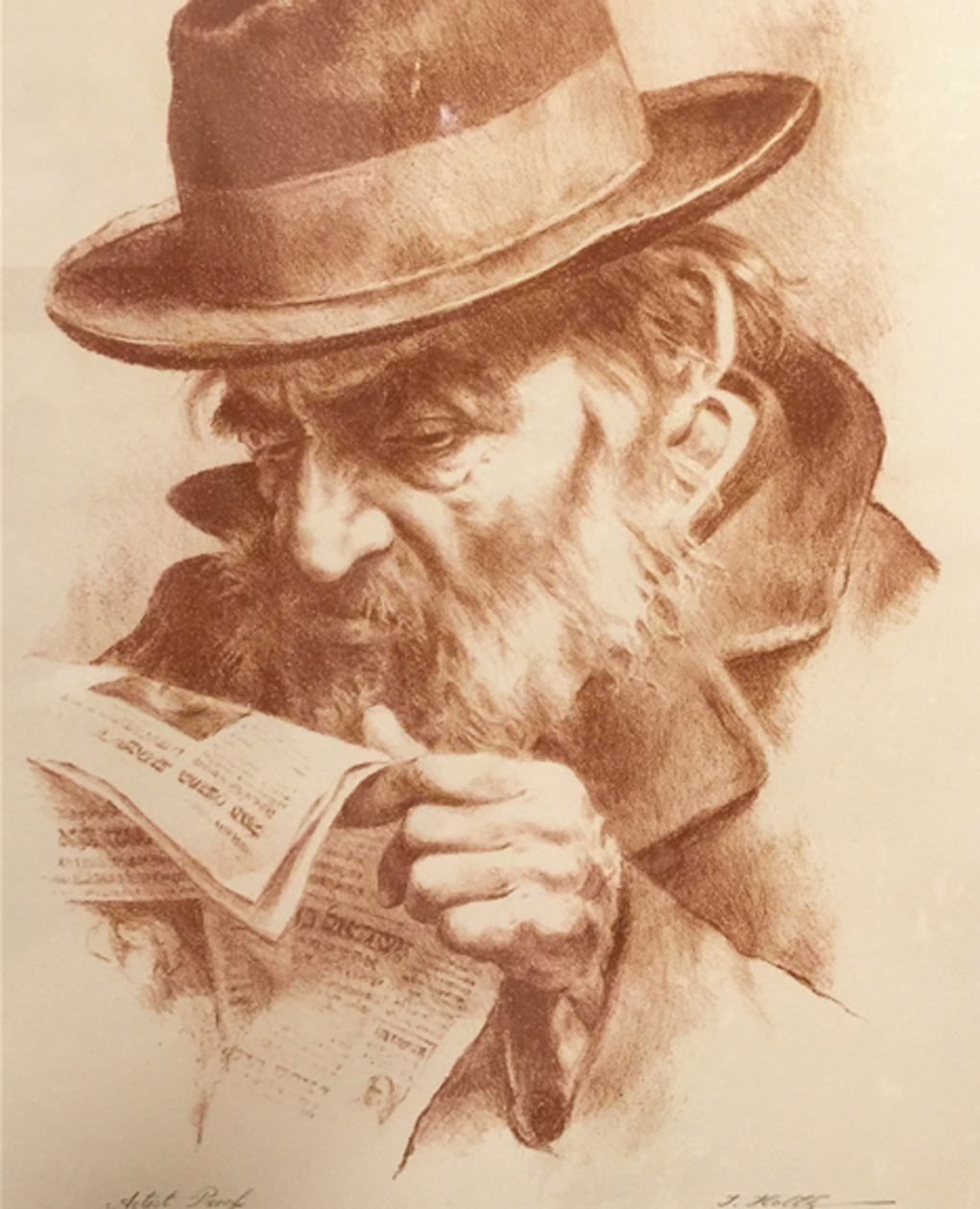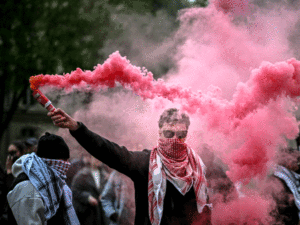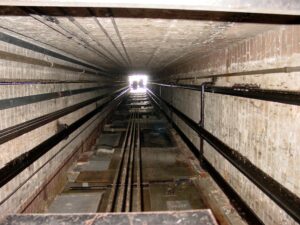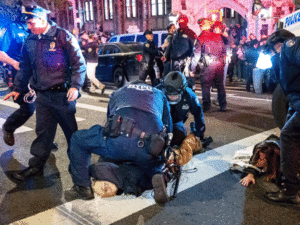A Yom Tov Replete with Shiurim
Pesach is now behind us, and the sense of elevation that accompanied us through Pesach has given way to the reality of daily life in the State of Israel. And the impact of that reality, unfortunately, is the exact opposite of the uplifting effects of the Yom Tov.
As could be expected, the Yom Tov itself was incredible. As a resident of Yerushalayim, I am able to experience all of the uplifting events of every holiday. First and foremost, if I may say so, is the traditional Birkas Kohanim that is held at the Kosel every Chol Hamoed, both on Sukkos and on Pesach. It is an experience that simply cannot be described to anyone who has never been there.
This year, it also served to expose the ignorance of the producers of Israel’s television news shows. Apparently, they reasoned that since the event is repeated twice annually, there was no reason to send a camera crew to film it again. It would be a waste of money to document an occasion that had already been caught on film in the past. To be honest, if they had used footage from a previous Pesach, no one would have been the wiser. But instead, they choose to broadcast a recording that was made at the most recent Birkas Kohanim – on Chol Hamoed Sukkos. Thus, the televised report of the Birkas Kohanim on Pesach was accompanied by images of Jews davening at the Kosel with their Arba Minim in hand!
There were other events as well, mostly shiurim. In the Israeli Yated Ne’eman, every shul in every city announces the shiurim that it will be holding. All a person needs to do is read the list of shiurim and choose a speaker he would like to hear. There are a plethora of options from which to choose. These shiurim take place in virtually every city in Eretz Yisroel, including places such as Tifrach, Ofakim, Haifa, and Akko. Of course, there are large numbers of shiurim that take place in Yerushalayim and Bnei Brak.
There are some rabbonim, such as Rav Asher Weiss, who evidently spend the entire Chol Hamoed delivering shiurim. Their names appear in a vast array of advertisements. Thanks to these drashos, I have had the good fortune of hearing from almost all of the roshei yeshivos in Eretz Yisroel over the past few years. That, in my opinion, is simchas Yom Tov at its finest.
Rav Pincus’s Parables
I will never forget two shiurim that I heard on a single day from Rav Shimshon Pincus zt”l. The first shiur was delivered in the Chanichei Hayeshivos shul in the neighborhood of Romema. After that shiur, I followed Rav Pincus to a different shul, Shaarei Tevunah, in the neighborhood of Ramot. These shiurim were delivered on Chol Hamoed Pesach, one year prior to the tragic accident that took his life.
This year, just before Pesach, we visited the cemetery on Har Hamenuchos to mark the yahrtzeit of Rav Pincus, his wife, Rebbetzin Chaya Mindel, and their daughter, Miriam, who lost their lives in that tragic accident on the night of bedikas chometz, the 12th of Nissan, 5761. It was a tragedy of unfathomable scope, which took the life of a man of indescribable stature. Rav Pincus was only 56 years old when he was suddenly taken from our midst. It is incredible to contemplate the vast amount that he accomplished during his lifetime. In fact, it is difficult to imagine how a single individual could possibly have done all that he did.
The way that his teachings have reverberated throughout the world since his passing is also an unprecedented phenomenon, and one that is likely never to recur. The breadth and depth of his shiurim that have been translated into printed seforim are simply extraordinary. And the widespread thirst for his teachings is also unprecedented. “There are certain seforim that become bestsellers in specific sectors or communities,” Rabbi Yehonasan Posen of Yefeh Nof once told me, “but Rav Shimshon’s seforim have an incredible universal appeal. Everyone has been captivated by his profound, polished style.”
Rav Yaakov Hillel once told me, “Rav Pincus created a revolution in the world, and he has been marbitz Torah after his passing no less than when he was alive.” As for the tragedy itself, he explained, “Rav Chaim said that it was a gezeirah on the entire generation. One might say that Hashem decided that it was necessary to drop a bombshell on the entire world.”
Recently, a group of bochurim from Yeshivas Nachalas Yair visited the kever of Rav Pincus to mark the first anniversary of the establishment of a shiur delivered by Shmuel Greenfeld, a distinguished bochur from Ofakim. Each of the participants had completed one or two masechtos, and the siyumim – as well as the conclusion of the zeman – were marked at his gravesite. From the cemetery, they returned to the bais medrash suffused with passion, deeply moved by the sense of the sweetness of Torah learning that the visit had somehow developed within them.
Rav Pincus’s children, from his eldest son – who succeeded him as the mara d’asra in Ofakim – to his youngest, are always astonished to hear comments such as, “You must hear a story about your father,” or, “Rav Shimshon saved my life!” Rav Eliyohu Yitzchok Pincus, one of his sons, recently heard, “I learned with your father in Bais Hatalmud in America. I was a young man. After davening, he asked me why I didn’t daven with more fervor. I explained to him that I didn’t understand all the words. Your father proceeded to take me into one of the classrooms, and he spent two and a half hours teaching me the entire Shemoneh Esrei.” Rav Shimshon Pincus was only 15 years old at the time!
Rav Pincus’s mesholim were expertly crafted parables that blended brilliance with creativity and artistic flair. He once asked, “Why was it necessary for us to leave Mitzrayim with a large amount of riches? The Jews were downtrodden, persecuted slaves. Why would it matter to them that they were receiving tremendous riches?” He answered this question with a parable: “Imagine that someone abducted your child and made him a slave. If you manage to free him two years later, he will be a free man after you rescue him, and he will have been a free man before he was captured. During his two years of captivity, though, he will have been a slave. But if his captor is forced to pay $100,000 for every day of servitude, it will demonstrate retroactively that he was always a free man. He was never a slave.”
Rav Pincus offered a similar parable to explain the mitzvah of Sefiras Ha’omer. Why, he asked, do we count the days of the Omer that have passed, rather than the days that remain? After all, our goal is to reach the 49th day. Wouldn’t it make sense to count down the days until we have reached that goal? If a person is told that he will receive a vast fortune after 49 days have passed, he will certainly focus on the number of days remaining until he receives the promised wealth. He will not count the number of days that have already gone by. Rav Pincus explained that there is a more accurate analogy for the mitzvah: If a person knows that he will earn a million dollars for every day that passes, then he will rejoice over each passing day. The days of the Omer are not merely a period of time that separates us from our goal. Rather, every day is part of a process that helps us achieve it.
The story of Rav Pincus’s life and death is incredible. His petirah struck like a fearsome earthquake. But even in death, he has continued leading a spiritual revolution.
To Have Nothing – Is to Have Everything
One of the shiurim that I attended on Chol Hamoed was delivered by Rav Shlomo Breuer, the mashgiach of Yeshivas Bais Mattisyahu. Rav Breuer is a well-known mechanech here in Eretz Yisroel, who delivers vaadim to yungeleit and advises thousands of talmidim. He is a son-in-law of Rav Gedaliah Eiseman zt”l, mashgiach of Yeshivas Kol Torah.
On the last day of Chol Hamoed, Rav Breuer delivered a shmuess at Bais Medrash Torah U’Tefillah in the neighborhood of Ramot. It was the first time I had attended one of his shmuessen and I immediately understood the reason for the widespread acclaim and admiration that he has earned.
Citing the posuk “And You heard their cries at the Yam Suf,” Rav Breuer questioned why the posuk singles out the events of Krias Yam Suf as the time when the Jewish people cried out to Hashem. After all, he pointed out, the Bnei Yisroel cried out to their Creator in Mitzrayim as well. He proceeded to quote a number of Medrashim with the same theme: that poverty is beneficial for the Jewish people. A pauper, he explained, is a person who recognizes his absolute dependence on Hashem. That is the epitome of a connection to Hashem, and it is the ultimate goal of every Jew – to recognize that his entire existence is dependent on his Creator. That was a recognition that the Jewish people reached only at the Yam Suf, after they had left Mitzrayim, when they saw that they were trapped between the desert and the sea. At that time, they felt that they were utterly dependent on Hashem’s mercy. They recognized that there was no other way that they could be saved. Thus, their cries were the cries of a people who understood that they had no power of their own, that they had no option other than turning to Hashem.
“A person who has nothing,” Rav Breuer added, “is a person who has it all. But if a person feels that he has his own intrinsic power, that he possesses some abilities or resources of his own, then he truly has nothing.”
B’Lev Echad –
A Powerhouse of Chessed
There were other events during Chol Hamoed that I should report to you about. One such event was held in the neighborhood of Ramot, when Rav Chaim Kanievsky arrived and we all had the good fortune of seeing him. It was an incredibly stirring experience. It was also short and to the point. I made my way from there to another event held concurrently by the Shas party, which was attended by Rav Shalom Cohen, nosi of the Moetzet Chachmei HaTorah. The latter event was attended by about 15,000 people and was also a remarkable experience.
After Pesach, I participated in an especially impressive event arranged by B’Lev Echad. I have written about this organization in the past, but I find myself amazed by it anew with every encounter. It is the brainchild of one man, Dovid Weitman, who realized his own dream of helping fulfill the dreams of children suffering from a variety of ailments, from Down syndrome to the worst possible illnesses in the world. B’Lev Echad regularly organizes events for these children and their families. And the fruits of their labors are simply beyond description.
The organization distributed tablets to the many sick children. In a play on words in Hebrew, the event was dubbed “Tab-lev.” The devices were loaded with content intended to bring joy to bedridden patients – amusing videos, clips of rabbonim and events, and shiurim. It was truly incredible. The patients will be able to keep the devices as long as they are ill. After they recover, they will return the tablets so that other patients can benefit from them.
I have been watching Weitman and his righteous friends, and I am regularly amazed by the wealth of ideas they are constantly generating in order to benefit sick children and their families.
Please Daven for Dovid ben Perla
Since we are discussing Chol Hamoed and the ill, I would like to broach a topic that is somewhat personal, but also has bearings on the community.
On several occasions, I have been to Shaare Tzedek Hospital to visit a patient in the oncology ward. This ward is located on the seventh floor. The patient is hospitalized in the room just behind the nurses’ station after undergoing a bone marrow transplant. Someone else I know was hospitalized in the same room two months ago and I visited him there as well. This patient revealed to me that the eighth day after the transplant was the most difficult day for him. He felt that he was in a state of total collapse, that he was completely helpless. Nevertheless, just a day or two later, he recovered completely. I suggested to my friend that he could expect the same thing, and that he should be prepared for the eighth day after his own transplant. He told me that he expected his situation to be somewhat different, since he had received a transplant from within his own body. I don’t know exactly what occurs in a bone marrow transplant. May we never need to know.
In any event, I paid a visit to this patient two hours before the Seder. It was almost time to light candles when I arrived. I wanted merely to tell him that we are all davening for his well-being. I made my way from the hospital directly to shul. Givat Shaul and Shaare Tzedek are very close to each other.
Now, why do I say that this is a matter of communal interest? Because the patient is none other than Dovid Azulai, the Minister of Religious Affairs of the State of Israel and a member of the Knesset for the past 22 years. We have been working together closely for the past 22 years. Azulai recently resigned from the Knesset, both because of his illness and so that he could be replaced by his son. (The younger Azulai is also a member of the Shas list for the Knesset.) Dovid retained his ministerial position. I would like to ask you to join me in davening for a refuah sheleimah for Dovid ben Perla.
Yom Hashoah in Nissan?
We have emerged from the uplifting days of Pesach and have been thrust into the dark days of modern life in the State of Israel. Israel will soon be observing three days. Here in Israel, there are three national commemorative days that are observed at this time of year.
The first of those days is Yom Hashoah, the national day of remembrance for the Holocaust. It is a difficult and sad day, which the government decided should be held on the 27th of Nissan, a time when the halacha prohibits hespeidim. The Chief Rabbinate tried to have the day established to coincide with a fast day instead, but the government won that battle.
This year, Yom Hashoah is on Thursday, April 12. Every year, the heartrending personal stories of various Holocaust survivors are published to mark the occasion.
Next week, there will be another two days that will be marked by the state. First, there is Yom Haatzmaut, the day celebrating Israeli independence. Yom Haatzmaut is officially observed on the fifth day of Iyar; this year, however, the fifth of Iyar falls on Friday. By law (a law that passed by the Knesset with great difficulty), Yom Haatzmaut is moved to an earlier date when the fifth of Iyar falls on a Friday or a Sunday. Why isn’t it postponed to a later date, you ask? Because the day before Yom Haatzmaut is Yom Hazikaron, the memorial day for fallen IDF soldiers and the victims of terror attacks. If Yom Haatzmaut were moved to Sunday, it would not prevent chillul Shabbos on Yom Hazikaron. Even if Yom Haatzmaut were postponed until Monday, Yom Hazikaron would still be observed after Shabbos, which has also proven problematic.
To make a long story short, Yom Haatzmaut will be observed next Thursday, the 4th of Iyar (April 19), and Yom Hazikaron will take place on Wednesday, the previous day. The transition between the two days – the day of mourning observed on Yom Hazikaron and the festive national holiday of Yom Haatzmaut – is marked by a torch lighting ceremony on Mount Herzl. And that leads us to our next topic.
Edelstein and Netanyahu Cross Swords
The annual torch lighting ceremony, which concludes the observance of Yom Hazikaron and kicks off the festivities of Yom Haatzmaut, takes place every year on Mount Herzl in Yerushalayim. The central figure at the event is the speaker of the Knesset. Today, that post is held by Yuli Edelstein. The ministers of the government, including the prime minister, as well as the members of the Knesset and other public figures, are invited to attend the event. It draws a crowd of about 6,500 people. Many people try to secure an invitation to the ceremony, which captivates the entire country and is broadcast on every television and radio station. The ratings for these programs are sky-high.
Why does this interest us, you ask? You will soon understand.
The ceremony revolves around the lighting of 12 torches, corresponding to the 12 shevotim. Every year, the Ministerial Committee on Ceremonies and Symbols chooses a specific format for the ceremony and decides on a topic to be addressed by all of the dignitaries who are invited to light the torches. Prior to Yom Haatzmaut, the media invites the public to name candidates to participate in lighting the torches. The candidates are meant to be individuals who are known for their exceptional accomplishments and are viewed as representing the subject chosen for the annual ceremony. A public committee then evaluates the candidates and selects the individuals it deems most fitting. The committee consists of between eight and ten members, including a representative on behalf of the chairman of the ministerial committee, a representative of the Knesset, and a representative of the prime minister. An invitation to light a torch at the ceremony is viewed as a sign of respect and gratitude. If you think back to last year, you may remember that the Diaspora torch was lit jointly by Michael Steinhardt of the Birthright program and Rabbi Marvin Hier of Los Angeles.
This year, however, is no ordinary year. It marks the 70th anniversary of the founding of the state. And the ministerial committee is chaired by Miri Regev, who is an ardent admirer of Prime Minister Netanyahu. Consequently, Regev decided that Netanyahu should be invited to speak at the event, along with the Speaker of the Knesset.
When Edelstein heard this, he refused to accept the decision. “If he comes, I will not come,” he announced. “There is no precedent for this. It is a disgrace to the Knesset!” Edelstein sent a letter to all of the members of the Knesset, asking them to boycott the event if the prime minister indeed came to speak. Regev then conceded that Netanyahu would not come. But in the midst of this brouhaha, it was revealed that at the torch lighting event celebrating the 50th anniversary of the state, a speech was indeed delivered by the prime minister – an office that was held by Netanyahu himself at the time. Twenty years ago, this was not considered an affront to the Knesset; the prime minister spoke, and there were no shameful repercussions. That revelation cast Edelstein in a very unfavorable light.
The Honduran Angle
But it didn’t end there. Netanyahu and Edelstein continued battling publicly for a full week, while every other public figure saw fit to score publicity points of their own from the highly publicized quarrel. The country became embroiled in their ugly clash. Ultimately, the turnabout was sparked by Juan Orlando Hernandez, the president of Honduras, who announced that he would accept the invitation to light a torch as a “graduate of Israel’s Foreign Ministry.” (Many years ago, Hernandez took a course offered by the Foreign Ministry for political leaders from outside Israel.) Hernandez asked the prime minister to accompany him. And that delivered the final blow to Edelstein.
Incidentally, Honduras was the second country – after the United States – to announce that it would be moving its embassy to Yerushalayim.
Edelstein immediately understood that he had a problem. Recently, he met with Netanyahu and a creative solution was announced: Netanyahu will be honored with lighting a torch, and he will receive the same invitation to speak for several minutes that is extended to every torch lighter. Edelstein, however, did not reveal whether he agreed to that idea. I presume that he will not have much choice in the matter.
This year’s torch lighting ceremony was expected to be the largest, most impressive and most expensive ceremony in the history of the state. Miri Regev, the Minister of Culture and Sports, commented this week, “This year’s torch lighting ceremony will bring the festive celebrations of Israeli culture and power to a new peak. This year, the torch lighting ceremony will present a degree of cultural richness that has never been seen before, blending the east and the west together and combining the entire country in a veritable symphony. The ceremony will also represent the innovations of contemporary culture alongside the heritage of the Jewish people, as well as the contributions made by the Jewish people and the State of Israel to the entire world. It will be a major celebration that will honor the Israeli spirit and culture.”
I do not care for this Israeli boastfulness. I can also tell you that many of these ceremonies have stirred up controversy, sometimes due to their inflated budgets and at other times because they featured immodesty. This year, though, has certainly set a record. The public quarrel between Netanyahu and Edelstein did not exactly earn the State of Israel much respect….
Why is it a Crime to Obstruct an Investigation?
Another subject of much interest this week is the issue of African infiltrators. That is the term for illegal immigrants from Eritrea and Sudan who have sought refuge in Israel and are terrorizing the residents of the neighborhoods where they have settled. For the most part, they have taken up residence in the Tel Aviv area, and close to Bnei Brak as well. The Supreme Court blocked the government’s efforts to deport the infiltrators and ordered them released from imprisonment. Netanyahu recently announced that he had reached an agreement with two African countries – Uganda and Rwanda – as well as the countries of Europe, with United Nations approval, for the infiltrators to be deported to those lands. Within a day, he made a complete about-face and announced that one country had refused to take in the infiltrators and that he had decided not to deport them. The government has found the entire issue to be a source of great consternation, and the solution that is now being proposed is for a new law to be passed calling for the illegal immigrants to be deported despite the Supreme Court’s ruling. In effect, this new law is meant to bypass the Supreme Court by stating explicitly that the law itself overrides any ruling of the court.
This is relevant to us for a very important reason: When we raised the idea of passing a different law that would override a ruling of the Supreme Court (the law that would exempt yeshiva bochurim from the draft), the Minister of Finance announced that he was unwilling to accept a law that would be an affront to the court. Nevertheless, he has given his approval to this law. He understood that if he did not agree to it, the wrath of the public would descend upon him. As far as we are concerned, that means that a good precedent has been set.
Meanwhile, Prime Minister Netanyahu is up to his neck in police investigations. I have now read that Netanyahu is also suspected of obstructing an investigation. It has apparently been proven that Nir Hefetz, who has turned state witness, ordered the Elovitches to destroy the records of all of their correspondence with the Netanyahu family. If Hefetz gave them those instructions on the orders of a member of the Netanyahu family, that would mean that the Netanyahus themselves will be suspected of obstructing justice. The prime minister’s son Yair may also be taken into police custody for questioning.
At this point, it is impossible to know what to think. On the one hand, I have to wonder how many more turns this investigation can possibly take. With so many developments, isn’t Netanyahu bound to be found guilty of something? On the other hand, if the police are still searching for evidence against him, it seems that his situation can’t be all that bad.
The truth is that I find it difficult to understand the concept of the crime of obstructing an investigation. If a person has an incriminating document in his home, does it make sense to prohibit him to destroy it? Is he really obligated to place his head into the lion’s mouth, so to speak? According to that logic, shouldn’t we pass a law requiring anyone who has committed a crime to come to the police and confess on his own volition? Why does it make sense to prohibit a person to destroy evidence that may be used against him, but not to obligate him to confess to any crimes he may have committed? What sort of law is this, anyway?
Tragic Degradation of Sifrei Torah
When a sefer Torah falls on the floor, we observe a fast. Many Jews have risked their lives to save Sifrei Torah from being destroyed by fire. No one will ever forget the Sifrei Torah that were burned on Kristallnacht; the destruction of those precious scrolls was one of the many tragedies of that dreadful night. When our enemies wish to harm us, they know that our Sifrei Torah are our most precious and beloved possessions.
One month ago, a malfunctioning air conditioner caused a fire in the Moroccan shul in the Usishkin neighborhood of Nahariya. The shul’s Sifrei Torah suffered damage in the blaze, and five firefighting teams arrived on the scene to prevent a loss of life. I was moved by the reports that the firefighters had provided first aid to a 67-year-old man who suffered from smoke inhalation while attempting to rescue the Sifrei Torah. His heroism is yet another testament to the spiritual grandeur of the Jewish people.
When Sifrei Torah are destroyed by arson, meanwhile, it is even more tragic. I am in possession of a newspaper clipping from the month of Av 5775, almost three years ago. The full-page article describes how the aron kodesh in Yeshivas Pischei Olam, on Rechov King George in Yerushalayim, was deliberately set on fire. According to the article, the mayor of Yerushalayim and the representatives of the chareidi parties visited the site of the blaze in a show of solidarity and protest over the arson attack. Their protest included “a demand for the State of Israel to use all of the resources at its disposal to capture the perpetrators.” I do not recall reading that the perpetrators were captured. Moreover, the secular press did not report the horrific incident at all.
Then there are thefts of Sifrei Torah. This is a scourge that has affected many shuls, particularly those in more remote moshavim. It is possible that it stems from the absence of police patrols in those areas, or from the thieves’ assumption that the gabbaim do not employ sufficient security precautions, and the fact that there are no security cameras installed in the shuls. Whatever the reason may be, it seems that these moshavim are particularly susceptible to the theft of Sifrei Torah, which are later sold by unscrupulous charlatans. One of the shuls that fell victim to these thieves is located in the community of Aviezer. In response to that incident, MK Yaakov Margi sent a parliamentary query to the Minister of Internal Security, who recently responded as follows:
“In the settlement of Aviezer, since the beginning of the year, there have been 11 incidents of burglary. Some of those incidents took place in private homes, others took place in businesses, and one involved the shul in the settlement. Nevertheless, I have been informed that in the area under the jurisdiction of the Matteh Yehuda police station, there has been a 30 percent decrease in the number of property crimes committed over the past year. In an effort to prevent these crimes completely throughout the entire area, especially in the settlement of Aviezer, security forces have been mobilized and a civilian course on alertness has been offered, with 12 residents registered. The police station has formulated a large-scale plan to prevent further crimes in the settlement and the entire area through its work in the year 2018.”
The minister’s response then moved on to our subject: “Regarding the shul, by nature it is not possible at this stage to reveal details of the findings of the investigation. Of course, I view crimes such as burglary and theft, in general, with the utmost severity due to their disruptions to the lives of ordinary citizens and their sense of security, especially when the crimes are committed in a holy place. Therefore, I expect that the Israel police force will do everything necessary, within the means available to it, in order to put an end to these phenomena quickly and professionally, and to bring the criminals to justice.”
In short, that means … absolutely nothing.
Waiting for a
No-Confidence Motion
The Knesset is still in recess. Its hiatus will continue until after Yom Haatzmaut. The Knesset also has rules that are inviolable. For instance, a motion of no confidence in the government is discussed only during the week after it is submitted. This leads to an interesting question: What will the Knesset do the first week of the summer session?
The summer session is scheduled to begin on Monday, almost two weeks from now, and it will begin with motions of no confidence. At the same time, a motion of no confidence cannot be debated until a week has passed, and it is impossible to submit a no-confidence motion during the Knesset recess. How, then, can the summer session begin with those debates? The answer is that the motions were submitted during the last week of the winter session. The following weeks, when the Knesset was in recess, do not count toward this limitation. Therefore, the proper date for the discussion of the motions is considered to fall at the beginning of the summer session. In other words, the opposition filed no-confidence motions a full month ago, and those motions are not scheduled to be discussed for another ten days. There is nothing inherently wrong with that, but they had to make sure that their topics would be relevant even after several weeks had passed. As it turned out, that was one hurdle that they overcame with ease.
The Zionist Camp filed a motion decrying “a government that creates rifts in Israeli society for the sake of its own survival, pays off certain sectors of society at the expense of the general populace, and harms the principles of democracy and the chances of peace.” The Arabs accused the government of being “a failure in the diplomatic, social, and economic realms.” Yesh Atid attributed its motion to “the government’s negligence in economic, security, diplomatic, and social matters,” and Meretz claimed that the government had “lost its way in the areas of diplomacy, social issues, economics, and civic affairs.” These are vaguely worded accusations that can always be made timely.
In addition to these motions, Herzl Day will be marked immediately after the summer session begins.
May we soon celebrate the final geulah…
A Fitting Response to Yair Lapid
Shortly before Pesach, Yair Lapid was in the Knesset, engaging in one of his vitriolic attacks against the chareidi community. Adopting his father’s style, Lapid began assailing the country’s bnei yeshivos: “Let me tell you where they would be without the IDF. They would be dead. Dead! Without the army, we couldn’t sustain the State of Israel. I don’t remember the Torah stating that it is permissible to send other people to be killed in your place. And I don’t remember the Torah stating that it is permissible to shirk your responsibilities. But that’s what this law is – a bill to accept dodging all responsibility, even the responsibility to Magen David Adom or to aid the disabled and the elderly within the community. That is also part of the law.”
Mickey Zohar responded, “No one is closing down the army.”
“We all know that this is the attitude of the chareidim,” Lapid continued, “but what about the shameful capitulation of the Likud and Bayit Yehudi? Whom do you think you are fooling? You are cowards! You are sacrificing the IDF and its soldiers for the sake of your narrow political interests. Since when is learning Torah a contradiction to serving and protecting your homeland?”
To that, Mickey Zohar retorted pointedly: “Since when is it considered serving in the army to write for Bamachaneh?”








